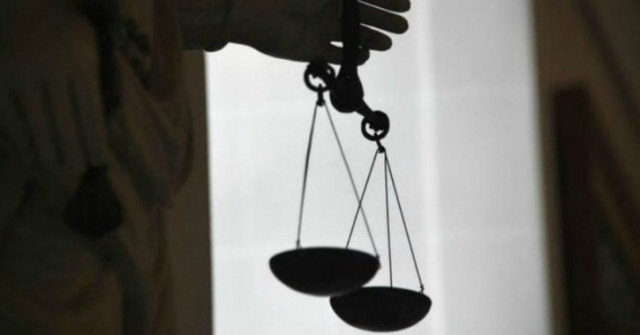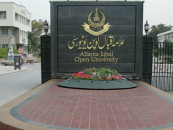Debate to bring in new white collar law to improve conviction rate in full swing
Legal experts examining whether to use ‘balance of probabilities’ or ‘beyond reasonable doubt’ as standard...

Justice. PHOTO: AFP
They are examining whether the standard of proof regarding corruption and corrupt practices should be ‘balance of probabilities’, which allows inference from circumstantial evidence, or ‘beyond reasonable doubt’.
The debate is being held in view of the claims made by major political parties that white collar crime is the biggest hurdle in the development of the country.
A former NAB official, who recently left a senior position at the bureau, said, “It is so difficult to convict anyone in a white collar crime case that there is a need to bring in a new legislation for this purpose.”
Memogate: Legal options being weighed to bring Haqqani back
The lawyers are divided whether the ‘balance of probabilities’ should be used by accountability courts in corruption cases.
A lawyer, who deals with white collar crimes, believed that ‘balance of probabilities’ was relevant in civil cases but in criminal matters, it’s required to exclude all possibilities that the accused was innocent and then convict him, adding that “this jurisprudence system is in place for several centuries, which is being applied to white collar crimes”.
Local governance: As polls end, a new debate begins
A section of lawyers said, “The country can only become corruption free when the same approach is adopted in all white collar crimes cases.”
A lawyer said, “If the courts use ‘balance of probabilities’ then it should not use it selectively as the same method should be adopted against all, including civil servants, judges and generals.”
However, former additional prosecutor general Ali Imran Jafferi said, “There is no need to amend the accountability law, instead investigation and prosecution should be improved further.”
He said, “Under the NAB law, the prosecution should have been given a source of income and it is the duty of the accused to explain that his income is not beyond his means of income.”
Work on Quetta Safe City project in full swing
Interestingly, Supreme Court Judge Justice Asif Saeed Khosa also gave his view in dealing with matters related to corruption.
However, senior lawyers want to debate on his approach to deal with cases of white-collar crime.
In his 192-page judgment in the Panama Papers case, Justice Khosa stated, “Corruption in high places is not a new phenomenon but the methods of corruption and concealing the proceeds of corruption have seen a dramatic change in recent times.”
He said that previously a corrupt official would make illegal money and then put the amount in his bank account or a bank account of someone close to him or would convert that amount into property.
As gun debate rages, Trump changes the subject
Such proceeds of corruption and the property acquired through the same were not difficult to detect and; therefore, the normal onus and standard of proof required in a criminal case, i.e. the prosecution to prove its allegations beyond reasonable doubt and the accused person presumed to be innocent till proved guilty were applicable to the cases of corruption as well.
“Things have, however, changed now. There are now tax havens available in different parts of the world and through the creation of offshore companies not only tax is being evaded by concealing wealth but even ill-gotten money is parked behind multiple veils of secrecy which are extremely difficult to lift or penetrate. This new development has forced legislatures around the world to modify the laws about onus and standard of proof in cases of corruption and even the courts and tribunals in different parts of the world are adopting different approaches for concluding as to whether the allegations of corruption levelled against an accused person have been established or not,” he stated.
Nisar sides with PTI’s Mazari in slamming visa-on-arrival policy in NA debate
Justice Khosa said, “Setting up an offshore company and concealment of ill-gotten wealth and assets behind its multiple veils of secrecy which may be extremely difficult to lift or penetrate pose new challenges to administration of justice worldwide and in the absence of direct or positive evidence such cases of corruption, corrupt practices and money laundering, etc may be solved through strong circumstantial evidence or material.”
Justice Khosa said, “Section 9(a)(v) of the National Accountability Ordinance, 1999 places a light initial onus of proof on the prosecution to establish that a holder of a public office, or any other person, or his dependent or Benamidar owns, possesses, or has acquired right or title in any asset or holds irrevocable power of attorney in respect of any asset or pecuniary resource disproportionate to his known sources of income or maintains a standard of living beyond that which is commensurate with his sources of income and thereafter a heavier onus shifts to the accused person to reasonably account for his ownership, possession, acquiring of right or title or holding irrevocable power of attorney in respect of such assets or pecuniary resources.”
Ensuring child rights in FATA
He further said that Section 14(c) of the National Accountability Ordinance, 1999 goes a step further and provides that “in any trial of an offence punishable under Clause (v) of Sub-section (a) of Section 9 of this ordinance, the fact that the accused person or any other person on his behalf, is in possession for which the accused person cannot satisfactorily account, of assets or pecuniary resources disproportionate to his known sources of income, or that such person has, at or about the time of the commission of the offence with which he is charged, obtained an accretion to his pecuniary resources or property for which he cannot satisfactorily account, the court shall presume, unless the contrary is proved, that the accused person is guilty of the offence of corruption and corrupt practices and his conviction, therefore, shall not be invalid by reason only that it is based solely on such presumption.”
The judge said that this change of approach in cases of corruption and corrupt practices was not just confined to Pakistan but there was also some international arbitral and common law authority available now showing that when it came to establishing corruption and corrupt practices in civil proceedings the standard of proof required was the balance of probabilities and understanding of a prudent man and not beyond reasonable doubt and that such an issue could even be clinched on the basis of circumstantial evidence.
The delimitation debate
Justice Khosa also reproduced a number of cases, which have been adjudicated by international tribunals to deal with corruption cases. “In civil proceedings at international level, the standard of proof in relation to corruption and corrupt practices is ‘balance of probabilities’ (allowing inferences from circumstantial evidence) and not ‘beyond reasonable doubt’,” he added.
However, a senior government official disagreed with the judge and said that there was a paradigm shift globally and there were no tax havens anymore, adding that there were no veils of secrecy and money could not be hidden away.



















COMMENTS
Comments are moderated and generally will be posted if they are on-topic and not abusive.
For more information, please see our Comments FAQ